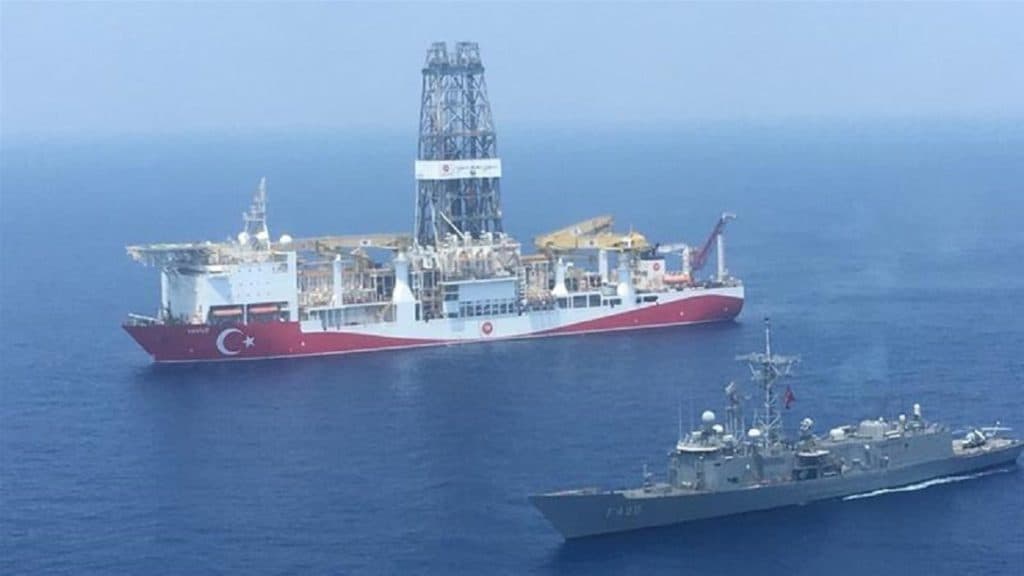By Dr Khushnam P N
The discovery of hydrocarbon resources in the Eastern Mediterranean has started the new scramble among the littoral states for their share and influence. The Turkish-Libya (Government of National Accord or GNA) deal on 27th November, 2019 which was later signed by the Turkish parliament has started new geopolitical competition in the region.

Thus emerging rival alliance of the countries brought a situation which needs pragmatic application of diplomacy to reach an amicable agreement giving realistic consideration to claims of one and all. The last two decades have witnesses increasing complexities in the disputing claims with accentuating pattern in the absence of a defined maritime boundary and close geographical proximity of the countries which makes it difficult to demarcate their Exclusive Economic Zones (EEZ) without their mutual acceptance and agreements.
This new competition started with the discovery of two small fields – Noa and Mari-B in 1999. In 2009, Tamar, a small gas field which contains around 80 billion cubic metre of gas now it supplies around 60% of electricity in Israel. In 2010, Leviathan was discovered by the US Company, Noble Energy which is expected to make Israel a net exporter soon. In 2011 (28th December)- Aphrodite Gas field was discovered around 160 km off the shore of Cyprus and only 30 km north west of the Leviathan.
In 2003, Greece, Cyprus, Israel and Egypt have mostly agreed on their EEZ boundaries. In 2004, Turkey had proposed EEZ demarcation deal with Egypt almost similar to 2019 Turkey-Libya but was declined by Egypt. The Johr Gas field of Egypt, discovered in 2015 started production in 2017 by Italian company Eni which would turn Egypt from an importer to net exporter. There are many major US and European companies involved in the region like Total of France, ExxonMobil and Noble of US,BG and BP of UK and Rosneft and Novatek of Russia besides Kogas of South Korea.
The participation of companies of these countries before clear demarcation and agreement has further compounded the issue. The competition entails potential conflict given the fact EEZ of the region is not delineated based 1982 UN Convention on the Law of Seas (UNCLOS). Besides, the major countries in the region, Israel, Syria and Turkey are not signatories to it. The EEZ of 200 miles to the countries are not possible owing to the small geographical space. Therefore it needs cooperative settlement of all the countries for a lasting maritime boundary. The emergence opposing groups of countries and start of the drilling work have made the claims inexorably conflictual.
The Mediterranean lies at the strategic crossroad of Europe, Africa and therefore has brought multiple factors and interests of powers into play. Eastern Mediterranean, more so, is making the competition of interests more complex which has assumed an enhanced intensity with the hydrocarbon politics. The close proximity and undefined maritime boundaries seems to be a recipe for potential intensifying conflict. The evolving pattern of the dispute is bringing European powers and their interests into the rivalries and conflicts of North Africa and West Asia. The UAE is supporting the alliance of Israel, Egypt, Cyprus and Greece to weaken Qatar and its Turkish alliance partner by supporting an alternate pipeline which would damage Qatar economically.
The Libyan conflict is also bearing the impact of intensifying competition in the Eastern Mediterranean. The proxy war in Libya between Government of National Accord (GNA) backed by Turkey and rebel forces led Gen. Khalifa Haftar supported by Russia, Egypt, France and UAE is making any possibility of amicable maritime agreement difficult in the region. After the Turkish Libya agreement, a statement of joint condemnation was prepared and signed by the foreign ministers of France, Greece, Cyprus, Egypt and UAE. Israel didn’t sign and remained silent based on its overall foreign policy and security vision based on its “Periphery Doctrine” in which Turkey assumes a prominent place despite their recent troubling relations.
Turkey and Israel had the closet warm strategic relations in the region which started showing strains during the Gaza war and subsequent differences between the leaders of the two countries. The Mavi Marmara incident a decade ago on 31st May, 2010 has changed the course of strategic alliance. In September, 2011, Turkey downgraded diplomatic ties with Israel and later on suspended the military cooperation as well.
Subsequently Turkey pursued an assertive role in the Eastern Mediterranean with its naval presence and actions. Thus instability and rabid conflicts in the region made Turkey to pursue a hard power ambition and defence self-reliance as a new politico-military agenda for the future. President Recep Tayyip Erdogan said, “Turkey must be powerful politically, economically, diplomatically as well as militarily.
We must increase our deterrence by improving our technology.” The Davutoglu Doctrine and Turkish “Strategic Depth” have completely transformed Turkey, its policy focus and pursuits in the region. It has been successful to reduce its defence dependence from 80 percent to 30 percent in two decades and aspire to become self-reliant by 2053. It is being perceived as a drone super power and its Anka-S drones produced by Turkish Aerospace Industries are almost analogous to the Repear drones of the US Air Force.
There is a talk of secret contact between Israel and Turkey about the peaceful settlement of maritime boundaries in the Eastern Mediterranean. The Libya-Turkish Maritime agreement has produced a tremendous consternation in Tel Aviv as the proposed East-Med pipeline in the Eastern Mediterranean is passing through the Turkish EEZ as per the new agreement. Besides, Israel’s decision of not to sign the joint statement condemning the Turkish agreement with Libya is being viewed as a strategic move to rope in Turkey in its long-term goal of pipeline diplomacy which needs cooperation of Greece as well as Turkey.
Despite recent incidence of strains, there is a considerable element of support in the US towards Turkey. The strategic value of Turkey is immense in the US policy in the region specially to strengthen its Israel and Iran policy with one step. Despite the issue of purchase of Russian S-400 by Turkey and differences in Syria, Turkey remains valuable NATO ally of the US to limit Russian expansion in the Mediterranean.
The New Asia Initiative vision of Turkey can have very adverse effect on the Western interest in general and Israeli goal in particular in the region as it gradually reduce Turkish dependence on the European and NATO networks for economic pursuit and security purposes. The Chinese string of pearls in this sub-region (Eastern Mediterranean) and the whole Mediterranean can further compound the situation.
The lack of a united stand of European Union on the issue is, to a large extent, responsible for the rising pattern of conflict among the claimant countries for their share of EEZ and their right to the hydrocarbon reserve. The support of the European Union to the stand of Greece and Cyprus has infuriated Turkey. Moreover, it has brought the Cyprus stalemate to the centre once again. Since 1974, Turkey has supported the Turkish Republic of Northern Cyprus.
On 14th January, 2019, seven countries, Cyprus, Greece, Israel, Italy, Jordon, Palestine and Egypt in Cairo, Egypt, set up the East Mediterranean Gas Forum to create a regional gas market and develop infrastructural network to offer competitive price. In January, 2020, France has officially requested to join the Forum while USA also wants to join it as permanent Observer.
Eastern Mediterranean (EastMed) is a proposed gas pipeline project , 1900 km long, which would connect the gas reserve of eastern Mediterranean via Cyprus to Greece and rest of Europe. Initially the pipeline is expected to transport ten billion cubic metres per year and the capacity can be increased to twenty billion cubic metres in the next phase. The final agreement for the project was signed in January 2020 by the energy ministers of Greece, Israel and Cyprus.
Turkey opposes the project agreement and said the project would not be successful by side-lining its interests and that of Turkish Republic of Northern Cyprus. It was further added that Turkey provides the commercially viable and secure transit route from the region to the European markets. Exclusion of Turkey and TRNC is apparent manifestation of futile political gamble and makes the project unsustainable.
All these development suggests that Turkey will remain focused to its right and position in the eastern Mediterranean and will sustain its pursuit based on balance of soft and hard power strategy. The pattern is evident with its dealing with Russia and upfront responses to the US
Turkish success in Libya and its demonstration of military might has raised its stature of influence in eastern Mediterranean competition. Its maritime agreement with Libyan GNA is a sure stumbling block on the path of MedEast project. Its assertive political position against the impending Israeli annexation of West Bank has weakened the Arab backers of the project in public perception.
At the moment, therefore, Turkey and Israel stand at the core of an amicable solution. A pragmatic adjustment of interests and long term strategic goals based on ‘Periphery Doctrine’ of Israel and ‘Policy of Zero Problem’ with neighbors can calm the flames of rising dispute and potential conflict in the Eastern Mediterranean.
Author: Dr Khushnam P N Independent IR and Regional Security Researcher and Analyst (Theories of IR & Regional Security, Politics and Security in West Asia, Indian Foreign Policy, Iran-Israel & US, Indo-Pacific, Geopolitics and Multilateralism). Specialization: Iran, US & Gulf Security. Bangalore, India
(The opinions expressed in this article are solely those of the author and do not necessarily reflect the views of World Geostrategic Insights)







